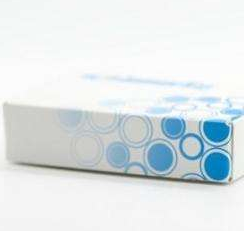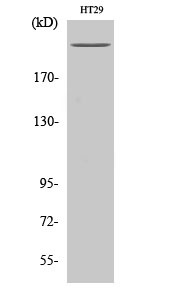Rpb1 (phospho Ser1619) Polyclonal Antibody
- Catalog No.:YP0871
- Applications:WB;IHC;IF;ELISA
- Reactivity:Human;Mouse;Rat;Monkey
- Target:
- Rpb1
- Fields:
- >>RNA polymerase;>>Huntington disease
- Gene Name:
- POLR2A
- Protein Name:
- DNA-directed RNA polymerase II subunit RPB1
- Human Gene Id:
- 5430
- Human Swiss Prot No:
- P24928
- Mouse Gene Id:
- 20020
- Mouse Swiss Prot No:
- P08775
- Immunogen:
- The antiserum was produced against synthesized peptide derived from human POLR2A around the phosphorylation site of Ser1619. AA range:1585-1634
- Specificity:
- Phospho-Rpb1 (S1619) Polyclonal Antibody detects endogenous levels of Rpb1 protein only when phosphorylated at S1619.
- Formulation:
- Liquid in PBS containing 50% glycerol, 0.5% BSA and 0.02% sodium azide.
- Source:
- Polyclonal, Rabbit,IgG
- Dilution:
- WB 1:500 - 1:2000. IHC 1:100 - 1:300. IF 1:200 - 1:1000. ELISA: 1:10000. Not yet tested in other applications.
- Purification:
- The antibody was affinity-purified from rabbit antiserum by affinity-chromatography using epitope-specific immunogen.
- Concentration:
- 1 mg/ml
- Storage Stability:
- -15°C to -25°C/1 year(Do not lower than -25°C)
- Other Name:
- POLR2A;POLR2;DNA-directed RNA polymerase II subunit RPB1;RNA polymerase II subunit B1;DNA-directed RNA polymerase II subunit A;DNA-directed RNA polymerase III largest subunit;RNA-directed RNA polymerase II subunit RPB1
- Observed Band(KD):
- 250kD
- Background:
- This gene encodes the largest subunit of RNA polymerase II, the polymerase responsible for synthesizing messenger RNA in eukaryotes. The product of this gene contains a carboxy terminal domain composed of heptapeptide repeats that are essential for polymerase activity. These repeats contain serine and threonine residues that are phosphorylated in actively transcribing RNA polymerase. In addition, this subunit, in combination with several other polymerase subunits, forms the DNA binding domain of the polymerase, a groove in which the DNA template is transcribed into RNA. [provided by RefSeq, Jul 2008],
- Function:
- catalytic activity:Nucleoside triphosphate + RNA(n) = diphosphate + RNA(n+1).,function:DNA-dependent RNA polymerase catalyzes the transcription of DNA into RNA using the four ribonucleoside triphosphates as substrates. Largest and catalytic component of RNA polymerase II which synthesizes mRNA precursors and many functional non-coding RNAs. Forms the polymerase active center together with the second largest subunit. Pol II is the central component of the basal RNA polymerase II transcription machinery. It is composed of mobile elements that move relative to each other. RPB1 is part of the core element with the central large cleft, the clamp element that moves to open and close the cleft and the jaws that are thought to grab the incoming DNA template. At the start of transcription, a single stranded DNA template strand of the promoter is positioned within the central active site cleft of
- Subcellular Location:
- Nucleus . Cytoplasm . Chromosome . Hypophosphorylated form is mainly found in the cytoplasm, while the hyperphosphorylated and active form is nuclear (PubMed:26566685). Co-localizes with kinase SRPK2 and helicase DDX23 at chromatin loci where unscheduled R-loops form (PubMed:28076779). .
- Expression:
- Fetal pancreas,Testis,
- June 19-2018
- WESTERN IMMUNOBLOTTING PROTOCOL
- June 19-2018
- IMMUNOHISTOCHEMISTRY-PARAFFIN PROTOCOL
- June 19-2018
- IMMUNOFLUORESCENCE PROTOCOL
- September 08-2020
- FLOW-CYTOMEYRT-PROTOCOL
- May 20-2022
- Cell-Based ELISA│解您多样本WB检测之困扰
- July 13-2018
- CELL-BASED-ELISA-PROTOCOL-FOR-ACETYL-PROTEIN
- July 13-2018
- CELL-BASED-ELISA-PROTOCOL-FOR-PHOSPHO-PROTEIN
- July 13-2018
- Antibody-FAQs
- Products Images
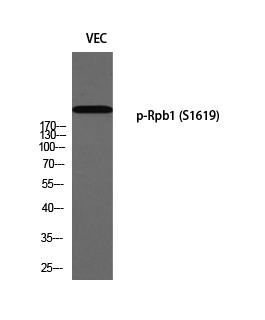
- Western blot analysis of VEC using p-Rpb1 (S1619) antibody. Antibody was diluted at 1:2000 cells nucleus extracted by Minute TM Cytoplasmic and Nuclear Fractionation kit (SC-003,Inventbiotech,MN,USA).
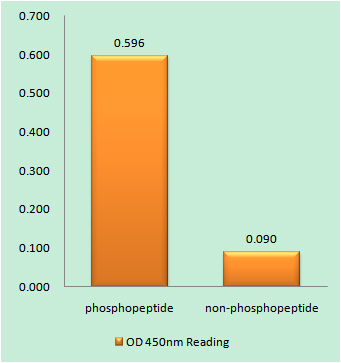
- Enzyme-Linked Immunosorbent Assay (Phospho-ELISA) for Immunogen Phosphopeptide (Phospho-left) and Non-Phosphopeptide (Phospho-right), using POLR2A (Phospho-Ser1619) Antibody

- Immunofluorescence analysis of HeLa cells treated with PMA 125ng/ml 30', using POLR2A (Phospho-Ser1619) Antibody. The picture on the right is blocked with the phospho peptide.
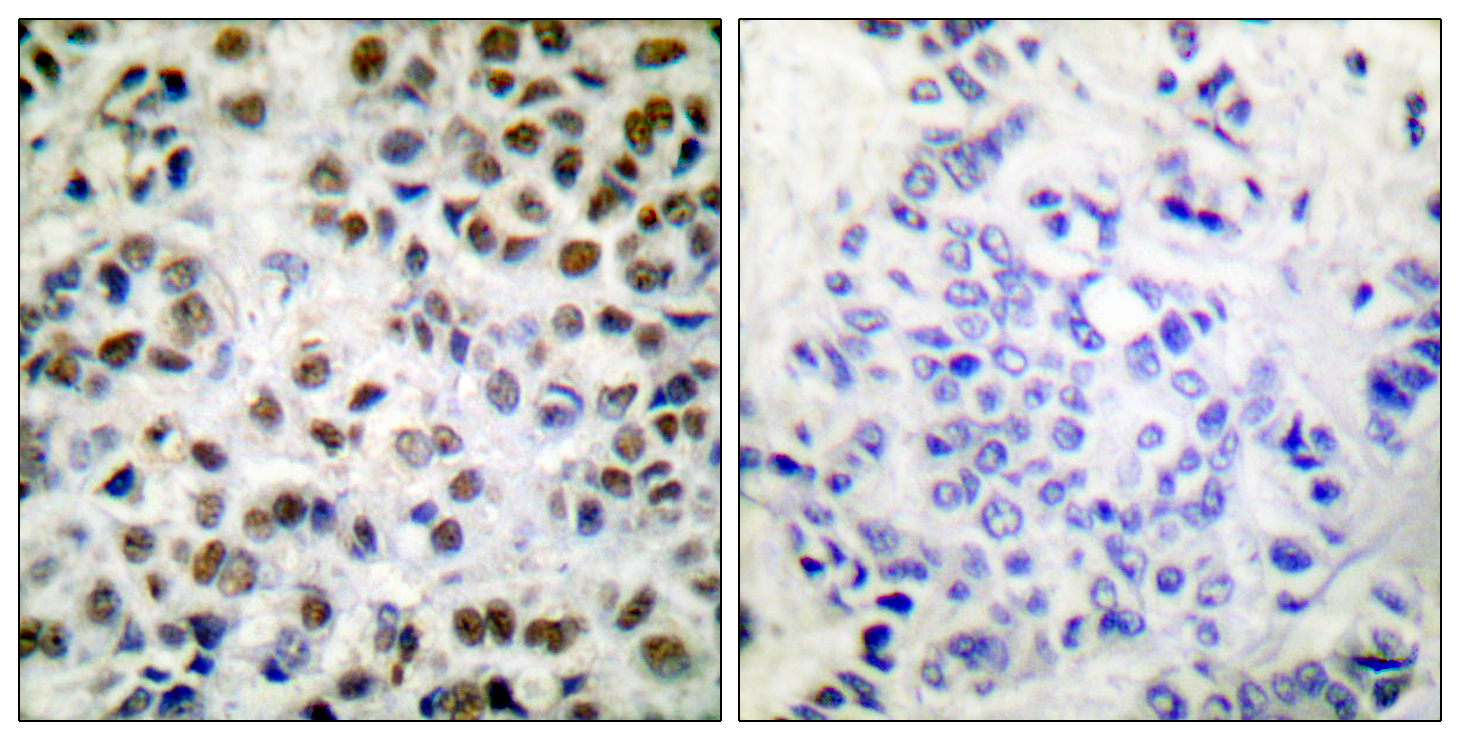
- Immunohistochemistry analysis of paraffin-embedded human breast carcinoma, using POLR2A (Phospho-Ser1619) Antibody. The picture on the right is blocked with the phospho peptide.

- Western blot analysis of lysates from COS7 cells treated with EGF 200ng/ml 30', using POLR2A (Phospho-Ser1619) Antibody. The lane on the right is blocked with the phospho peptide.
